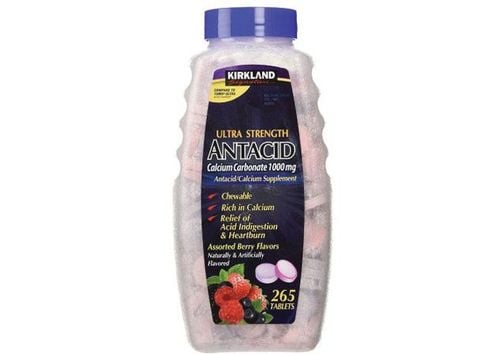This is an automatically translated article.
Antacid is a drug and how to use it is of great interest to many people, because this is probably a group of popular stomach and digestive diseases without a prescription, easily found in pharmacies. However, the use of Antacids still needs to be cautious and consult a doctor in certain cases.
1. What is Antacid?
Antacids are over-the-counter antacids that neutralize stomach acid to relieve symptoms caused by excess stomach acid such as:
Reflux of stomach acid into the throat causing a bitter mouth, dry cough , difficulty swallowing , swallowing pain; Heartburn caused by stomach acid backing up in the throat; Digestive disorders ; Undigested. Common ingredients of Antacid drugs are calcium carbonate, magnesium carbonate, sodium bicarbonate, ... which have fast and strong effects. However, it only helps to relieve the symptoms temporarily, not to treat the root cause of the disease.
2. How to take Antacid
Just like any other medicine, the safest and most effective way to take it is according to the directions for use. For the Antacid group, it is best to take it during or after eating, before sleeping, because this is the time when heartburn and indigestion symptoms often appear and the drug will have a longer effect.
Note, if you are taking other drugs, to avoid reducing the effectiveness, do not take these drugs for about 2 - 4 hours after using Antacid. In addition, alcohol should not be used while taking Antacids because it irritates the stomach and makes symptoms worse.
Antacids can be used for children, but the dose will be lower. If you have to take the medicine continuously, if you miss a dose, you should take it as soon as you remember, avoid taking a double dose on your own. If it is time for the next dose, skip the missed dose.

Thành phần phổ biến của thuốc Antacid là canxi cacbonat, magie cacbonat, natri bicarbonat,...
3. Antacid side effects
Antacids very rarely cause side effects. However, some symptoms are still possible in case of proper use of the drug:
Constipation ; Laxative ; Allergy; Become sensitive and reactive to certain foods and foods. As with many medications, taking them not as directed can cause some unwanted side effects. With the Antacid group of drugs, some types contain calcium, so overdose or abuse can cause:
Nausea or vomiting; Kidney stones ; Mood swings; Alkalosis.
4. Notes when taking Antacids
Antacids are generally safe to use, but for those containing magnesium carbonate and aluminum hydroxide, people with health problems should consult a doctor before taking.
Although Antacid is an over-the-counter drug, the following cases need a doctor's advice:
Women who are pregnant or breastfeeding; Children under 12 years of age or have liver, kidney or heart failure; Adults with cirrhosis or high blood pressure need to limit their sodium intake, because some Antacids contain sodium; Are taking anticoagulant or antiplatelet drugs. These are medicines that increase your risk of bleeding if you take an antacid that contains aspirin. Elderly people (over 60 years old), with a history of stomach ulcers or bleeding disorders, and people who have a habit of consuming alcoholic beverages should consult their doctor before taking Antacids containing aspirin.

Không nên dùng rượu khi uống thuốc Antacid vì làm cho dạ dày bị kích ứng
5. In what cases should antacids be used to see a doctor?
The use of Antacids can help relieve symptoms caused by excess stomach acid. But in some cases, these symptoms are indicative of a serious medical condition such as gastroesophageal reflux disease or peptic ulcer disease. At that time, the use of Antacid drugs only relieves the symptoms, not cures the disease. So, if taking Antacids doesn't help, you need to see your doctor soon.
In addition to stomach problems, a heart attack can also be confused with an upset stomach. When chest pain is accompanied by symptoms such as shortness of breath, dizziness, chest pain spreading to the shoulder, arm, jaw, neck or back pain, nausea, vomiting, the patient should immediately contact the emergency room.
Surely you already know “What is an antacid” after reading this article. However, it is important to remember that medication only relieves the symptoms, not the cause. Therefore, if there are signs of disease, it is best to see a doctor for advice, a definitive diagnosis and an appropriate treatment plan.
Please dial HOTLINE for more information or register for an appointment HERE. Download MyVinmec app to make appointments faster and to manage your bookings easily.













